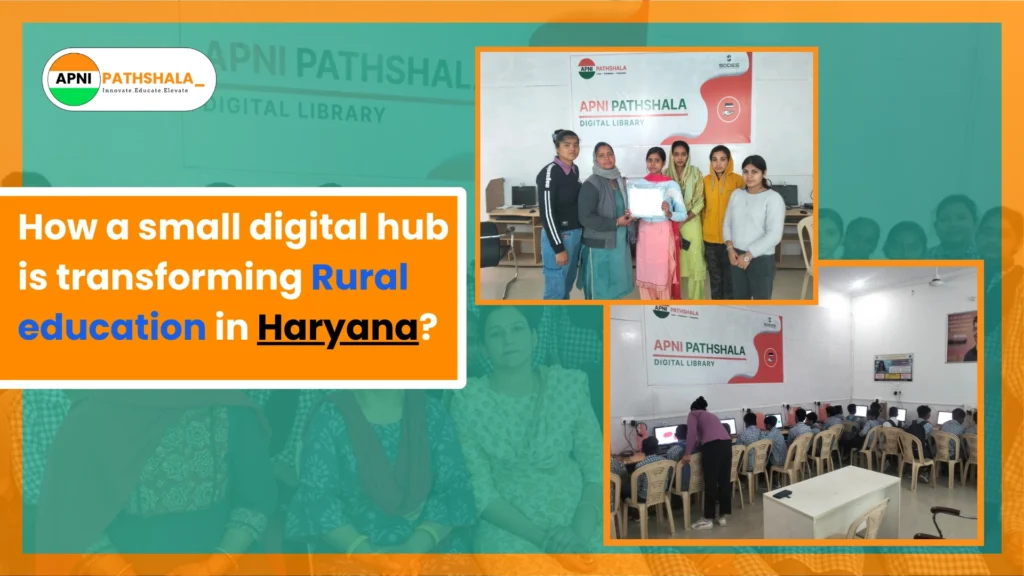How a small digital hub is transforming rural education in Haryana? (An Inspiring Journey)

What does it take to break age-old barriers and still bring the gift of education to hundreds?Sometimes, just one determined woman, a vision, and a village. This is the story of how one small digital education center in Haryana sparked a transformation, not just for school kids, but for an entire community. The Spark Behind the Mission Back in 2010, after teaching computer science at a college for five years, Sonubala Ma’am noticed something that stuck with her: Students had to travel 25 kilometres just to attend college. It made her wonder: why should education be such a distant dream for rural students?Why not bring computers and digital learning into the village itself? That seed of thought quietly took root. A few years later, after a short career break to raise her young children, she decided:If opportunities aren’t coming to the villages, it’s time to create them. And so began the journey of building a local computer education center in rural Haryana. Building Dreams From Scratch In 2015, she officially established her first CSC (Common Service Center). It was not just a place for government services; it was her platform to introduce digital literacy in the village. With sheer determination, she also set up an HKCL center and opened over 77 computer education centers, yes, 77 across the district! Initially, the center operated from a humble panchayat building, partitioned off to create a computer lab. It wasn’t perfect, but it was a start. She knew the government-owned building could be taken back anytime. So, by 2021, she made another bold move: investing in her own three-floor building completely with a computer training center, a digital library, and a playschool upstairs. Empowering Students of All Ages One thing was clear from Day 1: Learning could not be limited by age, gender, or background. Whether it was a school-going child, a working woman, or even an elderly villager, the doors of the digital hub were wide open. “Anyone, at any age, can learn,” she says, and she’s proven it thousands of times over. From working with PMGDISHA (Pradhan Mantri Gramin Digital Saksharta Abhiyan) to training over 10,000 villagers in digital literacy, to running special programs like Capgemini’s Passport to Education (P2E), her center became a spot for free digital education for rural students and adults alike. Today, her classroom sees kids, mothers, workers, farmers, and retirees sitting side by side, discovering the digital world together. No One Left Behind, Especially Girls But it wasn’t always a smooth journey. In 2010, rural Haryana was still down in traditions that often discouraged girls from studying, let alone embracing technology. When she first proposed starting a computer center, even her own family resisted. Her husband, working in the education department himself, was skeptical. Worse, her in-laws feared “what people would say“- the most common illness in our society! It took months of convincing and emotional discussions “Just give me one chance,” she had said. And eventually, they did. Today, ironically, the same people proudly introduce themselves as “Madam’s family“, a symbol of how one woman’s courage can transform not just minds but mindsets too. Partnering with Government Schools Success didn’t go unnoticed. Soon, principals from nearby government schools began approaching her. They wanted their students, especially those studying IT under NSQF (National Skills Qualifications Framework), to get real, practical digital skills. Knowing how much even a small monthly fee could burden poor families, she decided:No student from a government school would be charged. It wasn’t about money. It was about giving rural children, especially those from labourer and farmer families, a fighting chance at a better future. Today, she has trained hundreds of students from 9th to 12th grades, many of whom had never even touched a computer before. Recognition at National Level Her hard work caught the eye of the highest levels. In 2021, Dr. Ravi Shankar Prasad, then India’s IT Minister, visited her center. Her village was declared the first “Digital Village” in Haryana, creating a historic moment! That small dream, once doubted by many, had not only survived, it had bloomed into something national leaders recognised. Challenges Faced, Lessons Learned Was it easy? Not at all. But each obstacle taught her resilience, humility, and the power of community. “If I had stayed a college lecturer,“ she reflects, “maybe only a few students would have known me. But now, entire villages greet me by name.” The satisfaction of building something meaningful from scratch is priceless. The Role of Apni Pathshala: Strengthening the Mission Seeing the potential and impact of her work, Apni Pathshala came forward to amplify the mission. When they identified the growing need for a dedicated digital learning pod, Apni Pathshala collaborated and provided computers to her center. This partnership ensured that more students could access quality technology, updated systems, and structured learning programs, all free of cost. With the added support, her center could now cater to even more government school students, especially those preparing for important exams where digital literacy was crucial. This collaboration is a testament to what happens when community-driven initiatives and organisations work together for a larger cause. Final Thoughts: One Person Can Make a Difference When you walk through the doors of her center today, you don’t just see computers and students. You see hope.You see ambition.You see proof that digital education in rural India is possible and powerful. One woman’s decision to defy norms didn’t just change her own life. It opened a new world for thousands. And if you ever doubt whether one person can make a difference, just remember her story.
